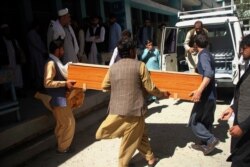U.S. President Joe Biden is set to speak Wednesday about his decision to withdraw all U.S. troops from Afghanistan by September 11 — the 20th anniversary of the terrorist attacks on the World Trade Center and Pentagon.
A senior administration official said ahead of the president’s remarks that Biden had determined “that the best path forward to advance American interests is to end the war in Afghanistan after 20 years, so that we can address the global threat picture as it exists today, not as it was two decades ago.”
WATCH LIVE at 2:15pm EDT
Secretary of State Antony Blinken was in Brussels Wednesday to discuss the withdrawal plans with NATO allies, and said the United States remains committed to Afghanistan’s future.
“Together we have achieved the goals that we set out to achieve, and now it is time to bring our forces home,” Blinken said.
Biden’s decision will keep 3,000 U.S. troops on the ground in Afghanistan beyond the May 1 deadline that had been agreed to in a deal Washington negotiated in Doha last year with the Taliban when Donald Trump was president.
“We've long known that military force would not solve Afghanistan’s internal political challenges, would not end Afghanistan’s internal conflict. And so, we are ending our military operations while we focus our efforts on supporting diplomatically the ongoing peace process,” said the senior U.S. official.
The Taliban on Wednesday said it wants all foreign forces out of Afghanistan “on the date specified in the Doha Agreement,” and that “if the agreement is adhered to, a pathway to addressing the remaining issues will also be found.”
Taliban spokesman Zabihullah Mujahid added on Twitter that "If the agreement is breached and foreign forces fail to exit our country on the specified date, problems will certainly be compounded and those (who) failed to comply with the agreement will be held liable."
News of the U.S troop withdrawal plans had already prompted the Taliban to cancel its participation in a 10-day peace conference between Afghanistan’s warring sides later this month in Turkey.
Meanwhile, a pessimistic U.S. intelligence report predicted a peace deal is unlikely in the next year and the Taliban — an enemy of the democratically elected government of Afghanistan — will make battlefield gains.
“The Afghan government will struggle to hold the Taliban at bay if the coalition withdraws support,” said an unclassified version of the report released by the Office of the Director of National Intelligence.
Critics of the United States staying in Afghanistan asserted it was a foregone conclusion “that we were going to lose anyway or that our allies would lose power anyway and therefore, why not just leave sooner rather than later?” said Michael O’Hanlon, senior fellow and research director of the Brookings Institution’s foreign policy program. “I think that's a flawed argument.”
O’Hanlon said, “this part of the world, that's been the source of the 9/11 attacks previously, could become one of the great No Man's lands for international terrorists to hide out in the future.”
According to Husain Haqqani, former ambassador of Pakistan to the United States: “The real question now is whether after withdrawing its troops, the U.S. will continue to help the Kabul government and the Afghan people keep the Taliban at bay.
Haqqani, the South & Central Asia director at the Hudson Institute, told VOA that the Taliban “have shown no interest in peace and the Doha process only reinforced their belief that U.S. eagerness to leave Afghanistan outweighed its concerns about that country’s future.”
Some analysts worry the American withdrawal will have ominous consequences for the people of Afghanistan.
“It could become like Syria — a multiple patchwork of different competing areas where there's hundreds of thousands of deaths rather than tens of thousands, where there's many millions of refugees and where there's complete chaos in certain parts of the country and a stronghold for terrorists,” warned O’Hanlon, a former member of the external advisory board at the Central Intelligence Agency.
There is also concern that the type of repression seen under the Taliban during its brief rule over Afghanistan could return and the United States would have little leverage.
The chairman of the Senate Foreign Relations Committee, Bob Menendez, a Democrat, said Washington could cut off financial assistance to Afghanistan "if there is backsliding on civil society, the rights that women have achieved."
Several prominent senators of the opposition Republican party are assailing the Democratic president’s decision.
The Biden administration “plans to turn tail and abandon the fight in Afghanistan,” said Minority Leader Mitch McConnell in a statement. “Precipitously withdrawing U.S. forces from Afghanistan is a grave mistake.”
The ranking member of the Senate’s armed services committee, Jim Inhofe, called it “a reckless and dangerous decision.”
“A full withdrawal from Afghanistan is dumber than dirt and devilishly dangerous,” according to Senator Lesley Graham. “President Biden will have, in essence, cancelled an insurance policy against another 9/11.”
Biden’s decision is winning praise from those who believe the United States is no closer to winning the war today than it was more than a decade ago or would be in the future.
“It has been harder in Washington to end a war than it is to start one,” said Quincy Institute Chief Executive Officer Lora Lumpe, a veteran humanitarian disarmament campaigner. “With this decision Biden has proven his ability to make the right calls even when they’re extremely difficult. The White House should be applauded for taking this off ramp from the 20-year-long war.”
Ayaz Gul in Islamabad and National Security correspondent Jeff Seldin contributed to this story.















